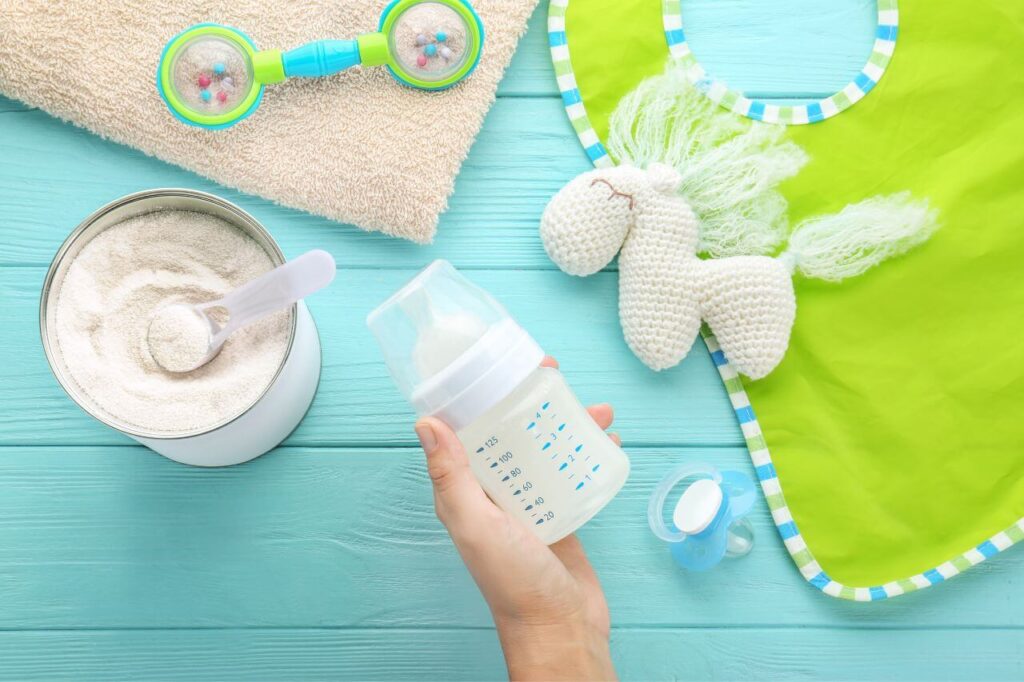Feeding infants is a crucial aspect of parenting, as it directly impacts their growth and development. As a parent, choosing the right method of feeding can be a daunting task, with two primary options available: formula feeding and breastfeeding.
In this article, we will provide a brief overview of both methods and compare their benefits and drawbacks. Our goal is to help parents make an informed decision about which method of feeding is best for their child.
Table of Contents
What is formula feeding?
Formula feed, also known as infant formula or formula milk, is a commercially manufactured substitute for breast milk that is designed to provide the essential nutrients needed for a baby’s growth and development. Formula milk can be made from cow’s milk, soy, or other protein sources and comes in powder, liquid, or ready-to-use forms.
Formula feeding is a common alternative to breastfeeding and is often used when a mother is unable or chooses not to breastfeed or when additional nutrition is needed beyond what breast milk can provide.
However, it is important to note that breast milk is the recommended and optimal source of nutrition for infants.
Reasons for supplementing with formula
As a mother, you may choose to supplement your baby’s diet with a formula feed for a variety of reasons, such as:
- Insufficient breast milk supply: If you are not producing enough breast milk to meet your baby’s nutritional needs, supplementing with formula can help ensure your baby is getting the nutrition they need.
- Difficulty breastfeeding: If your baby is having trouble latching onto the breast or cannot breastfeed due to medical conditions, supplementing with formula can provide the necessary nutrition.
- Health concerns: If you have certain health conditions or are taking medications that make breastfeeding unsafe or difficult, supplementing with formula can be an alternative source of nutrition for your baby.
- Work or travel: If you have to return to work or travel for extended periods, it can be difficult to breastfeed exclusively. Supplementing with formula milk can be a convenient and practical solution.
- Personal preference: If you choose to supplement with formula simply because you prefer to do so or feel that it provides a more balanced diet for your baby, that’s okay too.
It is important to note that while formula can be a good alternative, breast milk is generally considered to be the best source of nutrition for babies. As a recommendation, you can breastfeed your baby exclusively for the first 6 months of life and continue breastfeeding while introducing solid foods until at least 12 months of age.

Is breast milk better than formula?
Breastfeeding and formula feeding both have their advantages and disadvantages, and the best option for a baby will depend on individual circumstances and needs. Here are some factors to consider:
Benefits and drawbacks of Breastfeeding
Breast milk is widely considered to be the best source of nutrition for babies. It provides optimal nutrition for infants and contains antibodies that help protect babies from infections and illnesses. Breast milk also contains hormones and growth factors that promote the healthy development of the baby’s brain and other organs.
We already discussed the benefits of breastfeeding earlier. Here is a summary.
Benefits of Breastfeeding
- Nutritional benefits: Breast milk is the perfect food for infants, providing all the necessary nutrients in the right amounts to support their growth and development.
- Health benefits: Breastfeeding has been linked to a reduced risk of certain illnesses and diseases, including respiratory infections, ear infections, and allergies.
- Cost savings: Breastfeeding is free, which can save parents a significant amount of money compared to formula feeding.
- Bonding benefits: Breastfeeding can create a unique bond between mother and child, promoting feelings of closeness and security.
Disadvantages of Breastfeeding
There are no known disadvantages to breastfeeding. It is widely recognized as the best source of nutrition for infants, and the American Academy of Pediatrics recommends exclusive breastfeeding for the first six months of a baby’s life.
Benefits and drawbacks of Formula Feeding
Formula milk is a suitable alternative for babies who are unable to breastfeed or for mothers who choose not to breastfeed. The formula can provide the necessary nutrition for babies to grow and thrive.
Benefits of Formula Feeding
- Convenience: Formula feeding allows parents to easily and quickly feed their child without the need for preparation or breastfeeding.
- Flexibility: Formula feeding allows for more flexibility in scheduling and feeding, as multiple caregivers can feed the infant.
- Accessibility: Formula feeding can be a good option for mothers who are unable or choose not to breastfeed.
- Predictability: With formula feeding, parents can know exactly how much their child is eating and plan accordingly.
By weighing the benefits and drawbacks of each method, parents can make an informed decision about which method of feeding is best for their child.
Disadvantages of formula feeding
While formula feeding is a viable option for many families, there are several potential disadvantages to consider:
- Lack of Immune Protection: Breast milk contains antibodies that can help protect infants against infections and illnesses, while formula feed does not offer the same level of immune protection. This means that formula-fed babies may be more susceptible to infections and illnesses, particularly in the first few months of life.
- Increased Risk of Certain Health Problems: Research has shown that formula-fed babies may have a higher risk of certain health problems, such as ear infections, respiratory infections, and gastrointestinal issues.
- Cost: Formula can be expensive, particularly if a baby needs a special type of formula due to allergies or other health issues. Additionally, formula feeding may require the purchase of additional equipment, such as bottles and sterilizers.
- Preparation and Storage: Unlike breast milk, formula milk must be prepared and stored according to strict guidelines to ensure safety and proper nutrition. This can be time-consuming and requires a significant amount of effort.
- Lack of Bonding: Breastfeeding provides an opportunity for bonding between mother and baby, while formula feeding may not offer the same level of closeness and intimacy.
- Environmental Impact: The production and disposal of formula can harm the environment, particularly if bottles are not properly recycled.
It’s important to note that while these are potential disadvantages of formula feeding, many families choose to formula feed and have healthy, happy babies. Ultimately, the decision to breastfeed or formula-feed should be based on individual circumstances and preferences, and parents should not feel guilty or judged for choosing either option.
Our opinion: Breastfeeding is the better choice
As we mentioned, while formula feeding is a viable option for many parents, breast milk has significant advantages for the mother and the baby. Due to this, we strongly feel that it is a better choice than a formula. Even healthcare professionals and international organizations like WHO always recommend breastfeeding over formula feeding.
Having said that, every family’s situation is unique, and the decision of whether to breastfeed, formula feed, or use a combination of both ultimately depends on individual circumstances and preferences.

Tips for formula feeding newborns
If you have decided to formula feed your baby, there are some important tips to keep in mind to ensure that your baby is getting the nutrition they need and that the feeding process is safe and comfortable for both of you.
In this section, we will cover some helpful tips for formula feeding, from choosing the right formula to feeding frequency and preparation methods. By following these tips, you can help ensure that your baby is healthy, happy, and well-fed.
- Choose the right formula: There are different types of formula milk available in the market. Choose the one that is suitable for your baby’s age and needs. You may want to consult with your pediatrician before selecting a formula.
- Prepare the formula properly: Follow the instructions on the formula container carefully to prepare the formula. Use the right amount of water and powder and mix them well. Make sure the water is not too hot or too cold.
- Clean and sterilize the feeding equipment: Clean the bottles, nipples, and other feeding equipment thoroughly after each use. Sterilize them regularly to kill any bacteria.
- Feed on demand: Newborns usually feed every 2–3 hours. Feed your baby on demand whenever they show signs of hunger. Don’t force your baby to finish the bottle if it is full.
- Hold your baby properly: Hold your baby in an upright position during feeding to prevent choking and reduce the risk of ear infections.
- Burp your baby: Burp your baby after every feeding to help release any trapped air and reduce the risk of colic.
- Watch for signs of allergies: Watch for any signs of allergies such as rash, vomiting, or diarrhea. If you notice any of these signs, contact your pediatrician immediately.
- Store the formula safely: Store the formula in a cool, dry place and make sure it is not expired. Use it within the recommended time frame once it is opened.
Remember that every baby is different, so it may take some trial and error to find the best feeding routine for your newborn. Don’t hesitate to reach out to your pediatrician if you have any questions or concerns.
Final words About formula feeding and breastfeeding
The decision to formula feed or breastfeed is an important one for parents to make. While breastfeeding is often recommended for its numerous benefits, formula feeding can be a viable option for many families.
To summarize the key points of this article:
- Breastfeeding provides numerous nutritional and health benefits for both the baby and the mother, including natural antibodies, healthy brain development, and a reduced risk of certain health conditions.
- Formula feeding can provide convenience, flexibility, and accessibility for some parents, but it does not contain the same natural mix of nutrients as breast milk.
- Combination feeding, mixing breast milk and formula, can be an option for some families, but it’s important to be aware of the advantages and disadvantages and to follow safe mixing practices.
- Paced bottle feeding can help mimic the breastfeeding experience and promote healthy feeding habits for formula-fed infants.
Ultimately, the decision to formula feed or breastfeed is a personal one, and parents should make the choice that is best for their family. It’s important to remember that your child must be well-fed at all times and that both formula and breast milk can provide nourishment and comfort for infants.
We hope that this article has provided helpful information and tips for parents who are considering formula feeding, breastfeeding, or a combination of both. Remember, every family’s situation is unique, and the most important thing is to make the decision that feels right for you and your baby.






Leave a Reply